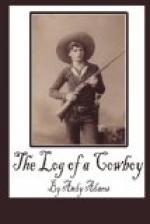While waiting our turns, the accident to the horse was referred to several times, and finally Blades, who was sitting in the game, turned to us who were lounging around the fire, and asked, “Did you all notice that look he gave me as I was uncinching the saddle? If he had been human, he might have told what that look meant. Good thing he was a horse and couldn’t realize.”
From then on, the yarning and conversation was strictly horse.
“It was always a mystery to me,” said Billy Honeyman, “how a Mexican or Indian knows so much more about a horse than any of us. I have seen them trail a horse across a country for miles, riding in a long lope, with not a trace or sign visible to me. I was helping a horseman once to drive a herd of horses to San Antonio from the lower Rio Grande country. We were driving them to market, and as there were no railroads south then, we had to take along saddle horses to ride home on after disposing of the herd. We always took favorite horses which we didn’t wish to sell, generally two apiece for that purpose. This time, when we were at least a hundred miles from the ranch, a Mexican, who had brought along a pet horse to ride home, thought he wouldn’t hobble this pet one night, fancying the animal wouldn’t leave the others. Well, next morning his pet was missing. We scoured the country around and the trail we had come over for ten miles, but no horse. As the country was all open, we felt positive he would go back to the ranch.
“Two days later and about forty miles higher up the road, the Mexican was riding in the lead of the herd, when suddenly he reined in his horse, throwing him back on his haunches, and waved for some of us to come to him, never taking his eyes off what he saw in the road. The owner was riding on one point of the herd and I on the other. We hurried around to him and both rode up at the same time, when the vaquero blurted out, ‘There’s my horse’s track.’
“‘What horse?’ asked the owner.
“‘My own; the horse we lost two days ago,’ replied the Mexican.
“’How do you know it’s your horse’s track from the thousands of others that fill the road?’ demanded his employer.
“‘Don Tomas,’ said the Aztec, lifting his hat, ’how do I know your step or voice from a thousand others?’
“We laughed at him. He had been a peon, and that made him respect our opinions—at least he avoided differing with us. But as we drove on that afternoon, we could see him in the lead, watching for that horse’s track. Several times he turned in his saddle and looked back, pointed to some track in the road, and lifted his hat to us. At camp that night we tried to draw him out, but he was silent.
“But when we were nearing San Antonio, we overtook a number of wagons loaded with wool, lying over, as it was Sunday, and there among their horses and mules was our Mexican’s missing horse. The owner of the wagons explained how he came to have the horse. The animal had come to his camp one morning, back about twenty miles from where we had lost him, while he was feeding grain to his work stock, and being a pet insisted on being fed. Since then, I have always had a lot of respect for a Greaser’s opinion regarding a horse.”




